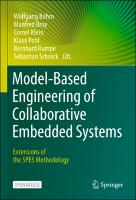Model-Based Engineering of Collaborative Embedded Systems
Extensions of the SPES Methodology
| dc.contributor.editor | Böhm, Wolfgang | |
| dc.contributor.editor | Broy, Manfred | |
| dc.contributor.editor | Klein, Cornel | |
| dc.contributor.editor | Pohl, Klaus | |
| dc.contributor.editor | Rumpe, Bernhard | |
| dc.contributor.editor | Schröck, Sebastian | |
| dc.date.accessioned | 2021-01-13T08:56:55Z | |
| dc.date.available | 2021-01-13T08:56:55Z | |
| dc.date.issued | 2021 | |
| dc.identifier | ONIX_20210113_9783030621360_20 | |
| dc.identifier.uri | https://library.oapen.org/handle/20.500.12657/46114 | |
| dc.description.abstract | This Open Access book presents the results of the "Collaborative Embedded Systems" (CrESt) project, aimed at adapting and complementing the methodology underlying modeling techniques developed to cope with the challenges of the dynamic structures of collaborative embedded systems (CESs) based on the SPES development methodology. In order to manage the high complexity of the individual systems and the dynamically formed interaction structures at runtime, advanced and powerful development methods are required that extend the current state of the art in the development of embedded systems and cyber-physical systems. The methodological contributions of the project support the effective and efficient development of CESs in dynamic and uncertain contexts, with special emphasis on the reliability and variability of individual systems and the creation of networks of such systems at runtime. The project was funded by the German Federal Ministry of Education and Research (BMBF), and the case studies are therefore selected from areas that are highly relevant for Germany’s economy (automotive, industrial production, power generation, and robotics). It also supports the digitalization of complex and transformable industrial plants in the context of the German government's "Industry 4.0" initiative, and the project results provide a solid foundation for implementing the German government's high-tech strategy "Innovations for Germany" in the coming years. | |
| dc.language | English | |
| dc.subject.classification | thema EDItEUR::U Computing and Information Technology::UM Computer programming / software engineering::UMZ Software Engineering | en_US |
| dc.subject.classification | thema EDItEUR::K Economics, Finance, Business and Management::KJ Business and Management::KJQ Business mathematics and systems | en_US |
| dc.subject.classification | thema EDItEUR::T Technology, Engineering, Agriculture, Industrial processes::TR Transport technology and trades::TRC Automotive technology and trades | en_US |
| dc.subject.classification | thema EDItEUR::U Computing and Information Technology::UY Computer science::UYQ Artificial intelligence::UYQE Expert systems / knowledge-based systems | en_US |
| dc.subject.other | Software Engineering | |
| dc.subject.other | Software Management | |
| dc.subject.other | Automotive Engineering | |
| dc.subject.other | Special Purpose and Application-Based Systems | |
| dc.subject.other | IT in Business | |
| dc.subject.other | Model-Driven Software Development | |
| dc.subject.other | Requirements Engineering | |
| dc.subject.other | Automotive Software Engineering | |
| dc.subject.other | Embedded Systems | |
| dc.subject.other | Open Access | |
| dc.subject.other | SPES Methodology | |
| dc.subject.other | Simulation | |
| dc.subject.other | Co-Design of Systems | |
| dc.subject.other | Business mathematics & systems | |
| dc.subject.other | Business applications | |
| dc.subject.other | Automotive technology & trades | |
| dc.subject.other | Automotive (motor mechanic) skills | |
| dc.subject.other | Expert systems / knowledge-based systems | |
| dc.title | Model-Based Engineering of Collaborative Embedded Systems | |
| dc.title.alternative | Extensions of the SPES Methodology | |
| dc.type | book | |
| oapen.identifier.doi | 10.1007/978-3-030-62136-0 | |
| oapen.relation.isPublishedBy | 6c6992af-b843-4f46-859c-f6e9998e40d5 | |
| oapen.imprint | Springer | |
| oapen.pages | 404 |

